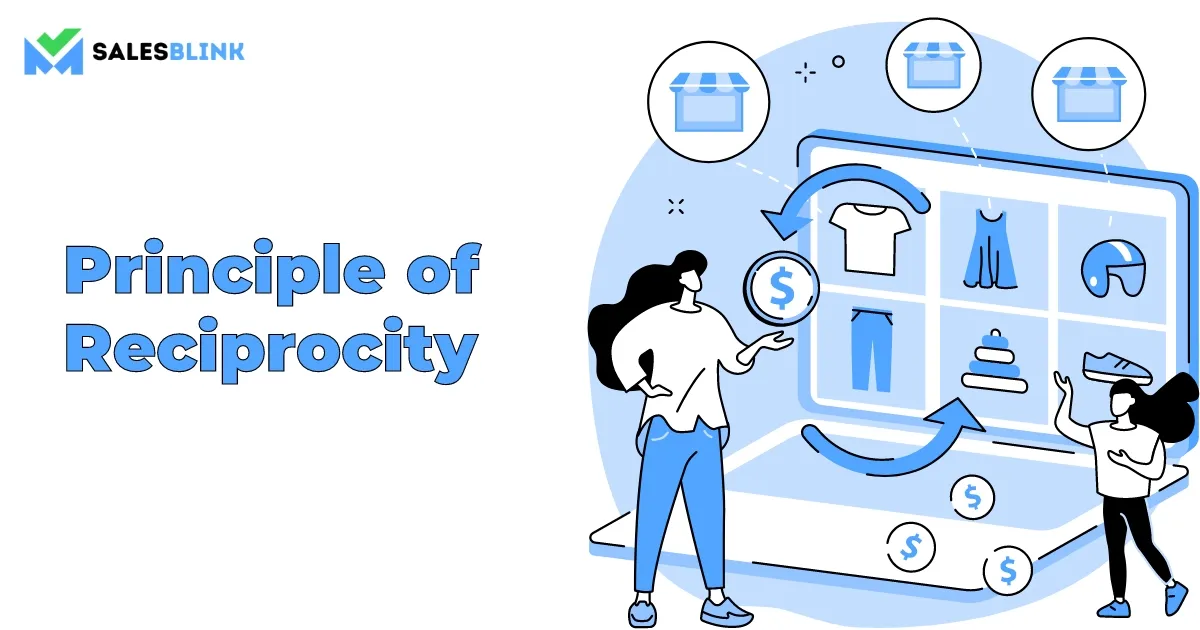How To Use The 7 Principles Of Persuasion To Increase Sales?
The ability to persuade and influence people is valuable in any business situation. Whether it’s getting a customer to make a purchase or convincing a colleague to take on a new project, the ability to persuade can be the factor differentiating success and failure.
However, if you can’t persuade as a salesperson, it may affect your ability to close deals.
Fortunately, some basic principles of persuasion can help you increase your chances of success. In this blog post, we’ll look at the seven principles of persuasion and how you can use them to increase sales.
By the end of this post, you will know how to create persuasive sales pitches and increase your chances of success.
So, let’s begin.
Table of Contents
- What Are Cialdini’s 7 Principles of Persuasion?
- Why Are The Principles Of Persuasion Still Relevant?
- Cialdini’s Principles of Persuasion
- How To Use Cialdini’s Principles of Persuasion In Sales?
- 1. Using the Principle of Reciprocity in Sales
- 2. Using the Principle of Scarcity in Sales
- 3. Using the Principle of Authority in Sales
- 4. Using the Principle of Commitment & Consistency in Sales
- 5. Using the Principle of Consensus in Sales
- 6. Using the Principle of Liking in Sales
- 7. Using the Principle of Unity in Sales
- FAQs
What Are Cialdini’s 7 Principles of Persuasion?
The principles of persuasion as per Robert Cialdini’s book – Psychology Of Influence refer to the techniques used to influence the opinions, beliefs, and behaviors of others. These persuasion techniques are based on psychological research and aim to increase the chances of a successful persuasion attempt.
Cialdini’s 7 principles of persuasion include:
- The Principle of Reciprocity
- The Principle of Scarcity
- The Principle of Authority
- The Principle of Commitment
- The Principle of Consensus
- The Principle of Liking
- The Principle of Unity
They are based on the psychology of persuasion.
While you apply these principles, tailor them to the audience and the situation. For example, if the goal is to persuade someone to donate to a charity, an appeal to emotion may be more effective than an appeal to authority. Ultimately, the key to successful persuasion is understanding the needs and motivations of your audience and finding ways to meet them.
To use the principles of persuasion correctly, you must understand each of them well. We know that, which is why we’ll show you what each principle means in detail. But, before that, let’s look at why the principles of persuasion are relevant to date.
Why Are The Principles Of Persuasion Still Relevant?
The principles of persuasion have been around for decades and are still just as relevant today. By understanding the basics of how people make decisions, one can better understand what motivates people and how to get them to take action.
Persuasion is all about understanding human psychology and using it to your advantage. It is about understanding the needs and wants of your audience and delivering a message that resonates with them. It aims at finding common ground and connecting with people on an emotional level.
The principles of persuasion are timeless and still just as important as ever. Knowing these principles can give you an advantage in any situation, whether you’re trying to convince someone to buy your product or to support your cause.
Cialdini’s Principles of Persuasion
Let’s look at the principles of persuasion one by one,
1. Principle of Reciprocity

The principle of reciprocity is an important part of persuasion. This principle states that people are more likely to be influenced by someone who has previously done something for them. For example, if a salesperson offers a free product sample, the customer is more likely to be persuaded to make a purchase. By offering something of value first, the salesperson establishes a sense of obligation and trust, making it easier to make the sale.
The principle of reciprocity finds its use in many areas of persuasion, from marketing to negotiation. It rests on the idea that people are more likely to return a favor if they have received one first. When used effectively, the principle of reciprocity can be an effective tool for influencing people.
2. Principle of Scarcity

The Principle of Scarcity is a persuasive technique to influence people’s decisions. It works on the idea that when something is rare or in short supply, it seems to be more valuable and desirable. This is because people naturally want what they cannot have.
The Principle of Scarcity is often used in sales and marketing, as it encourages people to take action quickly.
For example, a company may advertise a limited-time offer or a one-time discount to persuade people to buy their product. This technique works because it creates a sense of urgency and makes people feel like they need to act quickly. Companies can increase their sales and persuade people to take action by creating a perception of scarcity.
3. Principle of Authority

The Principle of Authority is a persuasion technique that capitalizes on people’s natural tendency to trust and obey those in positions of authority. This technique rests on the idea that people are more likely to comply with requests if they come from someone in a position of power or influence. This could be a doctor, a celebrity, or a leader in the community.
This technique can help influence people’s decisions, beliefs, and behaviors. For example, people may be more likely to buy a product if a celebrity endorses it or if their doctor recommends it. While the Principle of Authority can be powerful, it can also be easily misused, so it is important to use it ethically and responsibly.
4. Principle of Commitment & Consistency

The principle of consistency in persuasion rests on the idea that people are more likely to agree to something if they have already committed to it in some way. This could be as simple as agreeing with a statement or idea. The more a person expresses agreement and commitment to something, the more likely they will continue to agree with it and act upon it in the future.
This principle is often used in marketing and sales, as it can help to increase the chances that people will make a purchase or take other desired actions. You can use it in situations where one person is trying to persuade another. By finding ways to get the other person to agree with what you are proposing, you can increase the chances of success in persuading them.
5. Principle of Consensus (social proof)

The principle of consensus, or social proof, is a key concept in persuasion. This principle states that when we are uncertain about a decision, we tend to look at what other people are doing to guide our behavior.
For example, if you’re trying to decide whether or not to go to a particular restaurant, you might look at reviews or testimonials online or ask friends and family what they think. The idea is that if others have had a good experience, then you’re more likely to have a good experience as well.
You can use this principle in persuasive strategies such as advertising, where a company might highlight how many people have already purchased their product. By highlighting the consensus among other customers, the company can influence potential customers to make the same purchase. The principle of consensus is a powerful tool in persuasion and can be significantly effective in many different contexts.
6. Principle of Liking

The Principle of Liking is a psychological principle that states that people are more likely to be persuaded by someone they like. This means that if you want to be successful at persuasion, you need to make sure that the person you are trying to persuade likes or at least respects you.
You can do this by making an effort to build a friendly and positive relationship with the individual. It would help if you also tried to find common ground with them and make them feel comfortable around you. If a person likes you, they will be more likely to trust your opinion and be more open to your ideas. The Principle of Liking is an important part of persuasion and can help you be more successful in your attempts to influence others.
7. Principle of Unity

This principle of persuasion is a new entrant as the 7th principle. It is all about humans wanting to be a part of a community or a group and have a sense of belonging. It is like how we like getting unified based on gender, faith, or nationality. Similarly, all the Sherlock Holmes fans can connect better with each other and are happy to be a part of the group. Hope you get the point.
Now, as a business, you must build a connection with a group of individuals who share similar values and beliefs with common needs. You can do that in numerous ways, such as by creating clubs, groups, and teams. Additionally, you can do that in your pricing plans where one plan can be for ‘Hobbyists’ while another for ‘Professionals’. The prospects would then find out which one they can identify with and go ahead.
How To Use Cialdini’s Principles of Persuasion In Sales?
It is time to know how you can use the principles of persuasion in sales. Let’s take a look at it one principle at a time for both BDR & SDR,
1. Using the Principle of Reciprocity in Sales
As per the principle of reciprocity, people don’t like taking obligations. They would always want to do something in return. If you have a blog that provides impressive information to readers and adds value for free, the readers will mostly want to purchase what you offer. This will help increase conversions.
2. Using the Principle of Scarcity in Sales
When something is scarce, people want more of it. You can cash in on this psychology by offering time-limited deals. They will certainly make prospects make decisions faster, and that would get your cash registers ringing!
3. Using the Principle of Authority in Sales
When someone with authority says what to do, people are most likely ready to listen. So, if you have an authority figure representing your brand, it is possible to make more sales.
4. Using the Principle of Commitment & Consistency in sales
Humans like to be consistent; once they commit to something, they stay true to it. You can make website visitors download free guides or checklists so that their chances of becoming paying customers increases.
5. Using the Principle of Consensus in sales
People tend to do what other people are doing. They like to try what others are doing; therefore, providing social proof can help you convince potential customers to perform the desired action. You can include reviews of happy customers to get potential customers to convert. It works every time.
6. Using the Principle of Liking in sales
It is easy to get influenced by the person you like. To use this principle, you must create an About Us page for your website. It would help the visitors relate with the people behind your brand and spot the similarities. This way, there are chances for the prospects to like your brand and show interest in what you have to offer.
7. Using the Principle of Unity in Sales
To implement the principle of unity, you can always create an exclusive club and get people to join it. Just ensure that it is only for a few members, and you will see how well it works. Humans like to belong to a community, and you must make the most of this psychology.
If you ever feel low as a salesperson, do read sales motivational quotes to get back on track.
Time to Start Using The Principles Of Persuasion In Your Favor
As you saw above, the 7 Principles of Persuasion are invaluable for anyone who wants to increase sales and improve customer relationships. By understanding and applying the principles of reciprocity, commitment, authority, scarcity, liking, consensus, and consistency, you can devise persuasive techniques that will be more effective in getting your customers to perform action. So don’t wait – start using the 7 Principles of Persuasion today to increase your sales and maximize your profits! Additionally, learn how time management for sales reps provides desired outcomes.
FAQs
Cialdini’s 6 principles of persuasion include the principle of reciprocity, scarcity, authority, commitment, consensus & liking. The recently added 7th principle is the principle of unity. With all of these, it is possible to persuade prospects to convert.
Robert Cialdini’s is the brain behind the principles of persuasion. In his book, Psychology Of Influence, he refers to the techniques used to influence the opinions, beliefs, and behaviors of others. They are helpful in marketing & sales.
Yes, it is. The principle of consensus states that when we are uncertain, we tend to look at what other people are doing to guide our behavior. Therefore, providing social proof can help you convince potential customers to perform the desired action.







